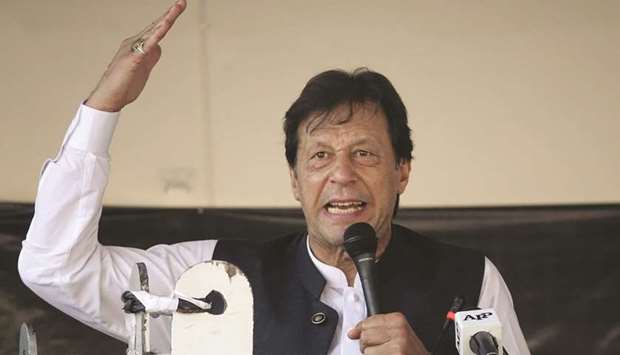Prime Minister Imran Khan led a rally yesterday in Pakistan-administered Kashmir to condemn a decision last month by India to strip the other part of the disputed region of a special autonomy.
Tens of thousands of people participated in the rally in the strongest protest so far after the move by New Delhi to annex Indian Kashmir on August 5.
Khan condemned the security lockdown of the Himalayan valley, where the Internet and telephone service remained partially shut for more than a month and restrictions have been imposed on people’s movements.
Thousands of people are believed to have been arrested in recent weeks by Indian authorities, while extra troops have been deployed to reinforce the 500,000 soldiers already stationed in one of the most militarised places on the planet.
Authorities in Indian Kashmir have arrested nearly 4,000 people since then, government data seen by Reuters showed.
“When atrocities get to their peak, people would prefer that death is better than this insulting life,” Prime Minister Khan said at the rally of several thousand people in Muzaffarabad, the capital of Azad Kashmir.
“I want to tell India that, by detaining thousands of people, you are pushing people into extremism,” he said. “People will rise against India, and it is not just about Indian Muslims, there are 1.25bn Muslims around the world. They all are watching this.”
The Indian crackdown has also spread fear among Pakistani Kashmiris with families on the Indian side.
Earlier this week, Pakistani Kashmiris who had been visiting family members in the Indian-administered part when the clampdown began told AFP how they had been stranded, caught in Delhi’s security dragnet for weeks until authorities allowed them to go home.
They were distraught at leaving their relatives behind to face an uncertain future.
“Nobody knows what will happen to them next ... There is desperation among the people,” Mohamed Sadiq, who went to Indian Kashmir to mourn the death of his brother, told AFP recently. “Our relatives are angry ... they believe that India is becoming anti-Muslim. It wants to become a Hindu state.”
At yesterday’s rally in Muzaffarabad, Prime Minister Khan called his Indian counterpart Narendra Modi a “coward” for attacking women and children in Kashmir.
He warned that Modi’s move on August 5 would have repercussions beyond the disputed Himalayan territory.
“When you give a message to 200mn Indian Muslims that India is only for Hindus, you will push them to violence,” he warned.
“I particularly want to give a message from here to you, Narendra Modi, that only a cowardly man would suppress people” as India has done in Kashmir, he told the flag-waving, chanting crowd.
“I will attend the UN General Assembly next week and God willing will not disappoint the Kashmiri people. I will take a stand there that no one has ever taken.”
He also insisted that Pakistan does not want to go to war with India again – but said Islamabad will respond to any hostility.
The nuclear-armed neighbours have fought three wars since independence in 1947, two of them over Kashmir.
Tensions have spiralled since New Delhi’s move on its side of the de facto border – the Line of Control (LoC) – to change the status of the territory, with Pakistan repeatedly likening Modi to Hitler and calling for international intervention.
The protest was held a day after a Pakistani soldier was killed in the latest exchange of fire with Indian troops in Kashmir, the army said.
The exchange occurred across the LoC, the de facto frontier that divides the Himalayan valley into the parts controlled by the two countries.
Both countries lay claim on the whole of Kashmir, a dispute that has been behind two of three wars between the South Asian rivals since their independence from Britain in 1947.
Deadly border skirmishes have increased since the Indian government’s decision, which has angered Pakistan.
Pakistan has reacted by downgrading diplomatic relations with India, suspending bilateral trade and halting cross-border transport services.
Foreign Minister Shah Mehmood Qureshi said this week that Islamabad feared that tensions might trigger an “accidental war” with India as he urged the international community to intervene.
On Tuesday, the minister told the United Nations human rights forum that India’s military presence in Kashmir raised the spectre of genocide.
The Delhi government has said that its abolition of Kashmir’s special status, which had allowed it to write many of its own laws, is meant to help to combat terrorism and to boost the region’s economic development.
About two-thirds of the population of Jammu and Kashmir is Muslim, while India has an overall Hindu majority.
India rules the heavily-populated Kashmir Valley and the Hindu-dominated region around Jammu city, while Pakistan controls a wedge of territory in the west.
China holds a thinly populated high-altitude area in the north.

Prime Minister Khan: I will attend the UN General Assembly next week, and God willing, will not disappoint the Kashmiri people. I will take a stand there that no one has ever taken.
